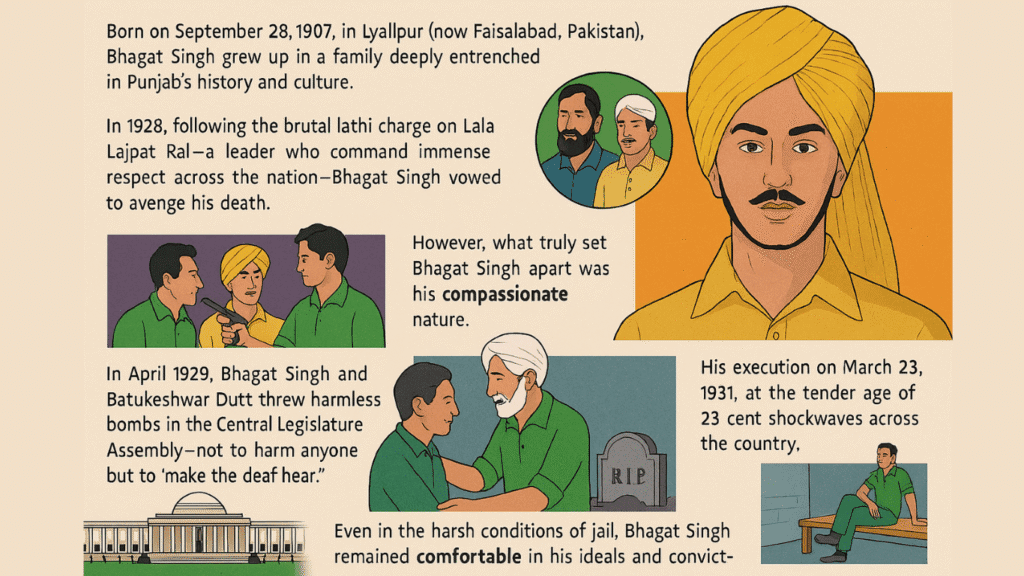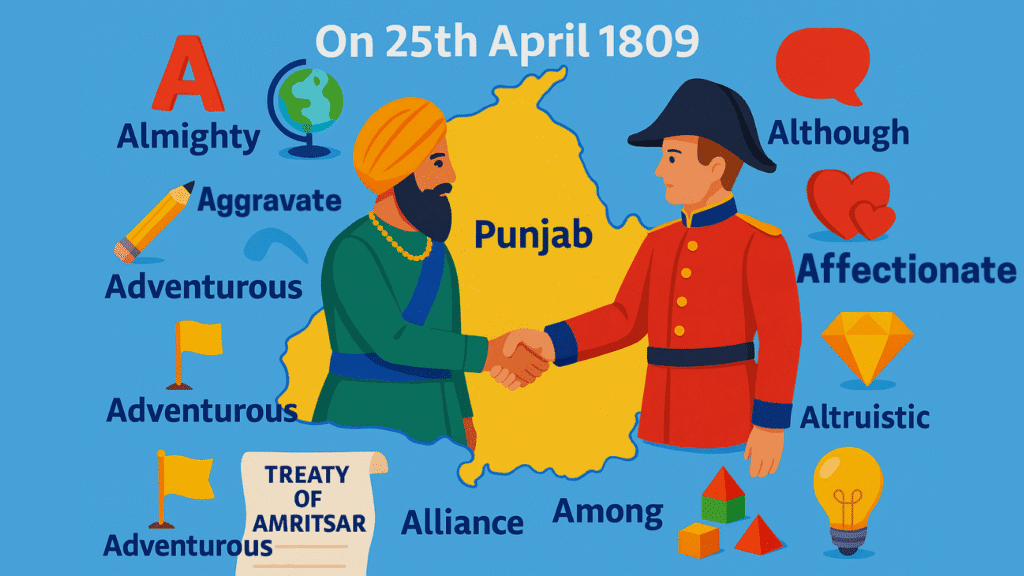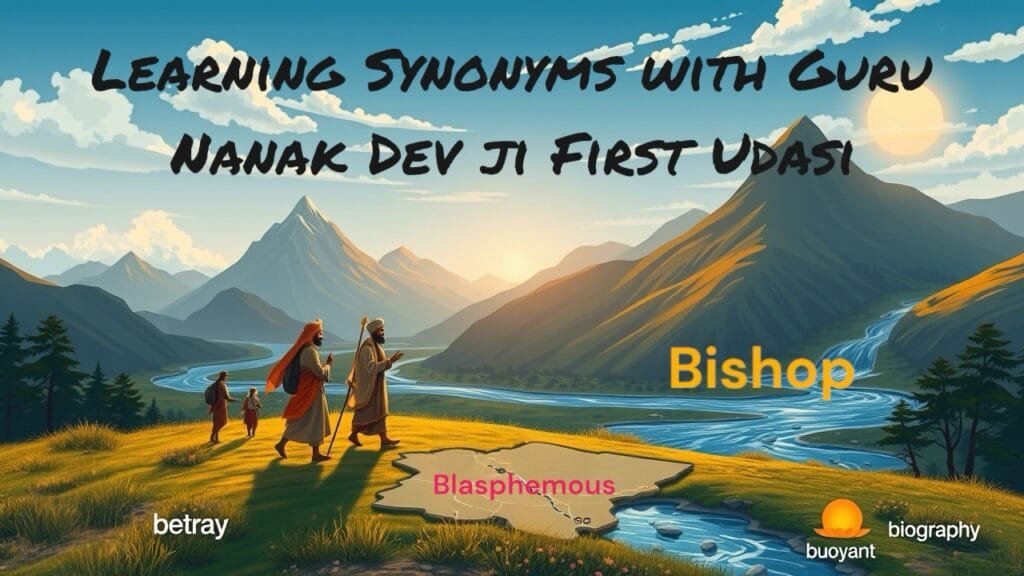
Bhagat Singh: A Revolutionary Icon and Vocabulary for CGl, CPO, CHSL, PSSSB, Punjab Police and other competitive exams Aspirants
Bhagat Singh, one of the most celebrate (to honor or praise publicly) figures in India’s freedom struggle, remains an enduring symbol of courage, conviction, and sacrifice. His life, marked by extraordinary acts of defiance against British colonial rule, continues to inspire generations. For aspirants, understanding his contributions is not only crucial for history but also offers valuable lessons in leadership, ethics, and patriotism. Let us explore his story while integrating ten essential vocabulary words that are frequently tested in competitive exams like SSC, CGL, CPO, CHSL, Punjab Police, Patwari, Excise Inspector, PSSSB, and others.
Table of Contents
The Life and Legacy of Bhagat Singh

Born on September 28, 1907 , in Lyallpur (now Faisalabad, Pakistan), Bhagat Singh grew up in a family deeply entrenched in Punjab’s history and culture. His uncles, Ajit Singh and Swaran Singh, were among the earliest voices of dissent against British policies. From a young age, Bhagat Singh was exposed to revolutionary ideas, which shaped his resolve to fight for India’s independence.
In 1928, following the brutal lathi charge on Lala Lajpat Rai—a leader who command (authority or control over something / ਕਮਾਂਡ) immense respect across the nation—Bhagat Singh vowed to avenge his death. Along with his colleagues (a person with whom one works in a profession or business / ਸਾਥੀ ਕਰਮਚਾਰੀ) Sukhdev and Rajguru, he meticulously planned and executed the assassination of John Saunders, a police officer implicated in Rai’s demise. This act demonstrated their command over strategy and discipline, even in the face of immense personal risk.
However, what truly set Bhagat Singh apart was his compassionate (showing kindness and concern for others / ਦਯਾਲੁ) nature. Despite being labeled as a radical, he harbored deep concern for the oppressed and downtrodden. His writings reflect his commitment to social justice, often compare (to evaluate similarities and differences between two things / ਤੁਲਨਾ ਕਰਨਾ) the plight of Indian peasants under British rule to that of slaves in other parts of the world.
In April 1929, Bhagat Singh and Batukeshwar Dutt threw harmless bombs in the Central Legislative Assembly—not to harm anyone but to “make the deaf hear.” They deliberately ensured no casualties occurred, showcasing their ability to compile (to gather information and put it together systematically / ਜਮਾ ਕਰਨਾ) thoughtful strategies that prioritized messaging over violence. Arrested shortly afterward, Bhagat Singh used his trial as a platform to articulate his vision for a free India.
His execution on March 23, 1931 , at the tender age of 23 sent shockwaves across the country. Though attempts were made to conceal (to hide something carefully so that it cannot be seen or found / ਲੁਕਾਉਣਾ) his final resting place, leaving no cemetery (a place where dead bodies are buried / ਕਬਰਿਸਤਾਨ) to mark his burial site, his legacy endures through the countless lives he inspired.
Even in the harsh conditions of jail, Bhagat Singh remained comfortable (providing physical ease and relaxation; free from stress / ਆਰਾਮਦਾਇਕ) in his ideals and convictions. He was unfazed by the complicated (involving many different parts or aspects that make it difficult to understand / ਗੁੰਝਲਦਾਰ) legal proceedings against him, facing them with remarkable clarity and composure.
Today, we celebrate (to honor or praise publicly / ਜਸ ਕਰਨਾ) his martyrdom as Shaheed Diwas, commemorating his unwavering dedication to the cause of freedom.
For a deeper dive into Punjab’s rich cultural heritage and its role in shaping leaders like Bhagat Singh, visit our page on Punjab History and Culture . Additionally, enhance your language skills with resources on Punjabi Grammar and English Naturally .
Vocabulary Words Integrated into the Passage
Below are detailed explanations of the ten vocabulary words used in the context of Bhagat Singh’s story, along with their meanings provided in both English and Punjabi within the passage itself. These will aid aspirants in mastering these terms for competitive exams.

1. Celebrate
- Meaning (English): To honor or praise publicly; to mark an occasion with festivities.
- Meaning (Punjabi): ਜਸ ਕਰਨਾ / ਮਨਾਉਣਾ
- Sentence from Passage: Today, we celebrate (to honor or praise publicly / ਜਸ ਕਰਨਾ) his martyrdom as Shaheed Diwas, commemorating his unwavering dedication to the cause of freedom.
2. Cemetery
- Meaning (English): A place where dead bodies are buried.
- Meaning (Punjabi): ਕਬਰਿਸਤਾਨ
- Sentence from Passage: Though attempts were made to conceal his final resting place, leaving no cemetery (a place where dead bodies are buried / ਕਬਰਿਸਤਾਨ) to mark his burial site…
3. Colleague
- Meaning (English): A person with whom one works in a profession or business.
- Meaning (Punjabi): ਸਾਥੀ ਕਰਮਚਾਰੀ
- Sentence from Passage: Along with his colleagues (a person with whom one works in a profession or business / ਸਾਥੀ ਕਰਮਚਾਰੀ) Sukhdev and Rajguru, he meticulously planned and executed the assassination of John Saunders…
4. Comfortable
- Meaning (English): Providing physical ease and relaxation; free from stress.
- Meaning (Punjabi): ਆਰਾਮਦਾਇਕ
- Sentence from Passage: Even in the harsh conditions of jail, Bhagat Singh remained comfortable (free from stress or worry / ਆਰਾਮਦਾਇਕ) in his ideals and convictions.
5. Command
- Meaning (English): Authority or control over something; skillful handling.
- Meaning (Punjabi): ਕਮਾਂਡ / ਹੁਕਮ
- Sentence from Passage: Lala Lajpat Rai—a leader who command (authority or control over something / ਕਮਾਂਡ) immense respect across the nation…
6. Compare
- Meaning (English): To evaluate similarities and differences between two things.
- Meaning (Punjabi): ਤੁਲਨਾ ਕਰਨਾ
- Sentence from Passage: His writings reflect his commitment to social justice, often compare (to evaluate similarities and differences between two things / ਤੁਲਨਾ ਕਰਨਾ) the plight of Indian peasants under British rule to that of slaves in other parts of the world.
7. Compassionate
- Meaning (English): Showing kindness and concern for others.
- Meaning (Punjabi): ਦਯਾਲੁ
- Sentence from Passage: However, what truly set Bhagat Singh apart was his compassionate (showing kindness and concern for others / ਦਯਾਲੁ) nature.
8. Compile
- Meaning (English): To gather information and put it together systematically.
- Meaning (Punjabi): ਜਮਾ ਕਰਨਾ / ਇਕੱਠਾ ਕਰਨਾ
- Sentence from Passage: They deliberately ensured no casualties occurred, showcasing their ability to compile (to gather information and put it together systematically / ਜਮਾ ਕਰਨਾ) thoughtful strategies that prioritized messaging over violence.
9. Complicated
- Meaning (English): Involving many different parts or aspects that make it difficult to understand.
- Meaning (Punjabi): ਗੁੰਝਲਦਾਰ
- Sentence from Passage: He was unfazed by the complicated (involving many different parts or aspects that make it difficult to understand / ਗੁੰਝਲਦਾਰ) legal proceedings against him, facing them with remarkable clarity and composure.
10. Conceal
- Meaning (English): To hide something carefully so that it cannot be seen or found.
- Meaning (Punjabi): ਲੁਕਾਉਣਾ
- Sentence from Passage: Though attempts were made to conceal (to hide something carefully so that it cannot be seen or found / ਲੁਕਾਉਣਾ) his final resting place…
By studying these words within the context of Bhagat Singh’s life, aspirants can not only enrich their vocabulary but also develop a deeper appreciation for India’s freedom struggle.
FAQs
1. Who was Bhagat Singh?
A: Bhagat Singh was a revolutionary freedom fighter who fought against British colonial rule and is celebrated for his bravery and sacrifice.
2. What does the word ‘celebrate’ mean?
A: ‘Celebrate’ means to honor or praise publicly, often by marking an occasion with festivities.
3. Why is Bhagat Singh called a martyr?
A: Bhagat Singh is called a martyr because he sacrificed his life for India’s freedom at the age of 23.
4. What is the meaning of ‘command’?
A: ‘Command’ means having authority or control over something, or skillful handling of a situation.
5. How did Bhagat Singh inspire others?
A: Through his courage, ideals, and writings, Bhagat Singh inspired countless individuals to join the freedom struggle.
6. What does ‘compassionate’ mean?
A: ‘Compassionate’ means showing kindness and concern for others, especially those in need.
7. Why are these vocabulary words important for exams?
A: These words are frequently used in competitive exams like UPSC, SSC, and others to test language proficiency and comprehension skills.
8. What is the meaning of ‘conceal’?
A: ‘Conceal’ means to hide something carefully so that it cannot be seen or found.
9. How can I improve my vocabulary for competitive exams?
A: Read regularly, learn word meanings in context, and practice using them in sentences, as shown in this article.
10. What is the significance of Shaheed Diwas?
A: Shaheed Diwas, observed on March 23, commemorates the martyrdom of Bhagat Singh, Sukhdev, and Rajguru, celebrating their sacrifice for India’s freedom.



















